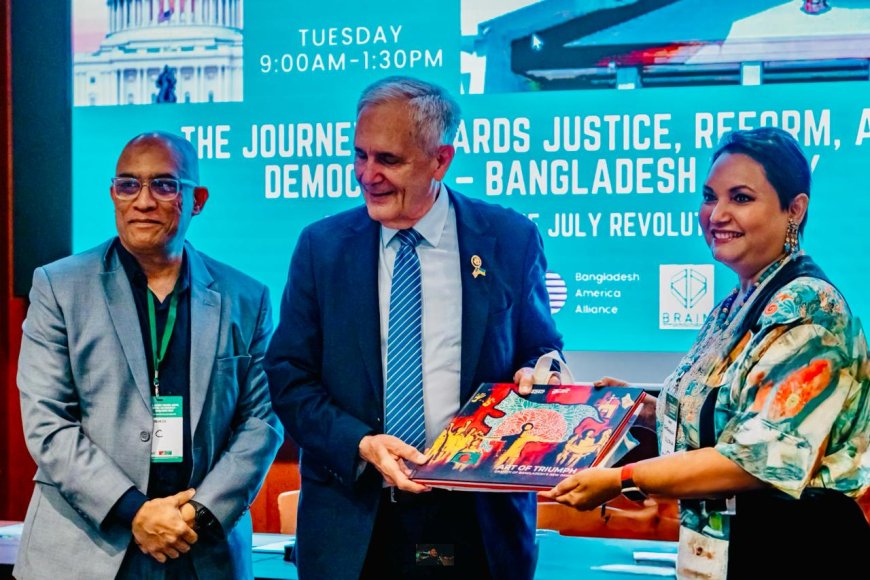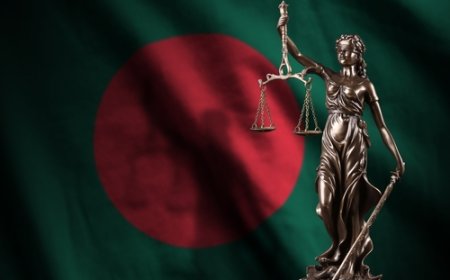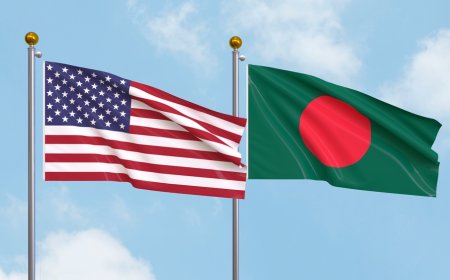Reflections from Capitol Hill: A Year On in Washington and Dhaka
One year after the July Revolution, the path ahead is still being shaped. The violence, sacrifice, and demands of the Bangladeshi people must not be forgotten or undermined.

On July 15, a Congressional briefing was held on Capitol Hill in Washington, DC, under the title “The Journey towards Justice, Reform, and Democracy -- Bangladesh Today, One Year After the July Revolution.”
Organized by the Bangladesh America Alliance, Right to Freedom, and the Bangladesh Research, Analysis and Information Network, the event brought together policymakers, members of Congress, scholars, diaspora members, and civil society to reflect on the ongoing transformations in Bangladesh and to discuss what lies ahead.
Congressman Lloyd Doggett (D-TX), who sponsored the event, delivered a powerful keynote speech, addressing the authoritarian legacy of the former regime of Awami League and emphasizing the need for sustained democratic support in South Asia.

Congressman Jim McGovern (D-MA), Co-Chair of the Tom Lantos Human Rights Commission, reiterated the importance of human rights and US foreign policy that centers justice and dignity.

Jon Danilowicz, President of Right to Freedom, highlighted the historical significance of the July 2024 revolution and the critical path forward.
As Co-Chair of the Bangladesh America Alliance, my opening remarks reflected on the revolution’s continuing reverberations and the aims of the seminar: to create space for honest, critical, and independent dialogue.
This event marked the first formal Congressional engagement on post-revolution Bangladesh. In the face of earlier silences, it created a platform to voice the concerns of those who continue to fight for accountability, justice, and democratic reform. It was significant that many of the speakers were independent scholars, analysts, and advocates, not party-affiliated representatives, underscoring the importance of diverse perspectives and a principled commitment to democracy, human rights, and accountability.
The July Revolution of 2024, led largely by students and young activists, erupted in response to years of state violence, deepening authoritarianism, systemic corruption, and the erosion of democratic processes. Over 1,400 lives were lost in the crackdown. Yet the revolution also revealed a different future, one rooted in collective resistance, intergenerational solidarity, and a refusal to normalize repression.
The July Revolution represented more than regime change. It represented the refusal of an entire generation to accept the normalization of brutality. Two panels captured the depth of the current moment and the stakes ahead.
The first, titled Lessons from the July Uprising, was moderated by me and featured Auroni Semonti Khan (Jagannath University), Catherine Cooper (RFK Human Rights), and Dina Siddiqi (NYU). We reflected on the revolution as a mass, multi-generational uprising rooted in decades of frustration.
The panelists explored the importance of community-based resistance, the roles of women and youth in driving change, and the risks of returning to authoritarian habits. Movements at the neighborhood, factory, and campus levels matter as much as moments in parliament.
The conversation ranged from transitional justice to economic precarity. The need for election reform, labor protections, adherence to international human rights treaties, and civic space were all emphasized. A particular concern was how youth unemployment continues to threaten democratic futures. There was a clear call for supporting local civil society and resisting the erasure of collective memory.
The second panel, Bangladesh and the World, moderated by Shamarukh Mohiuddin (Cadmus Group), included Ambassador (ret.) Dan Mozena, Michael Kugelman (Foreign Policy), Moushumi Khan (The Asia Group), and Ehteshamul Haque (American University).
The discussion focused on Bangladesh’s shifting foreign relations, especially the implications of deepening ties with China, and how a recalibrated US foreign policy could play a constructive role.
The panelists stressed the need for equitable economic relations and an end to extractive partnerships. While trade and investment are necessary, they must not come at the cost of civil liberties and labor rights.
The geo-political terrain has changed, but the fundamentals remain: international actors must engage with civil society, not just ruling elites. Bangladesh’s future will not be secured through economic deals alone. It will depend on whether governance is reformed, whether rights are respected, and whether youth are given real opportunities.
What emerged across opening speeches, the panels, and subsequent discussions was a sober yet hopeful vision: that the revolution opened a political horizon that must not be foreclosed. The Interim Government, led by Dr. Muhammad Yunus, has raised expectations for reform. Yet as many panelists noted, reform is not inevitable. It requires vigilance, organization, and meaningful support, especially from the international community.
The United States has a long and complicated history with Bangladesh. This moment offers a chance to reset that relationship based on democratic values and mutual respect, not having India as the intermediary.
Policymakers must listen to Bangladeshis directly, engage more substantively with Bangladeshi civil society, and condition bilateral relations on meaningful democratic progress. The same applies to economic partnerships: American businesses and agencies must ensure that trade and investment do not entrench authoritarian structures.
The Bangladeshi diaspora has a critical role to play. We are more than remittance-senders or occasional voters. We are educators, advocates, and engaged citizens of conscience. We must continue to raise awareness, lobby our representatives, and speak out against injustice. Silence is complicity.
One year after the July Revolution, the path ahead is still being shaped. The violence, sacrifice, and demands of the Bangladeshi people must not be forgotten or undermined. The event on Capitol Hill was an important step in amplifying those voices and reminding international actors that democracy in Bangladesh is not an abstract principle, but a lived, urgent, and unfinished struggle.
As we mark this anniversary, let us commit to keeping Bangladesh in our political imaginations, not only as a site of suffering but as a space of possibility. Justice and reform will not come without pressure, and democracy will not flourish without solidarity. The stakes remain high. But so does the resolve.
Dr. Farhana Sultana is a Professor at the Maxwell School of Citizenship and Public Affairs of Syracuse University. She is also the co-chair of the Bangladesh America Alliance.
What's Your Reaction?















































































